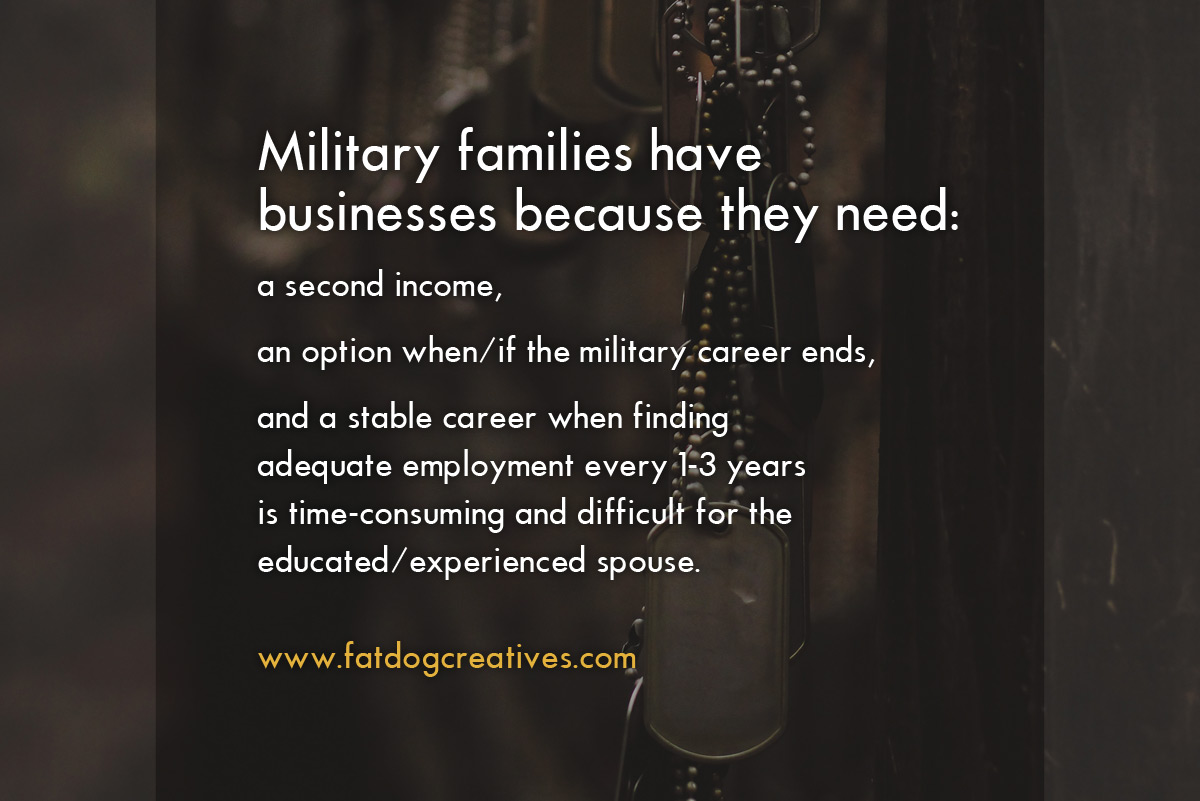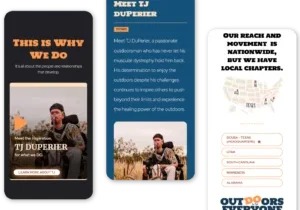How Can Freelancers in Military Families Buy Locally
Share this article.
Buying locally was easy in a population with pride in local goods and services. My struggle and the internal conversation began not only when I left the Austin area but also when I landed in yet another part of the country running my own graphic design business. How can I encourage buying locally when my locale changes frequently?
By Rhonda Negard and Todd Brogowski
In the first 15 years of my career, I lived in one general area. Buying locally was easy, especially in Austin, a population with rare pride in local goods and services. The non-existent struggle made doing business locally not only simple but expected. I did not realize this local culture was so rare until I moved out of the area.
My struggle and the internal conversation began not only when I left the Austin area but also when I landed in yet another part of the country running my own graphic design business.
How could I encourage loyalty to me from clients and potential clients when my locale changes ever 1-3 years?
The Situation
As freelancers (transient military family businesses), we want to support our communities. One of the most significant opportunities to support the community is to “buy local.” However, for many of us in military families, buying local can be difficult when what is local changes from year to year (if not month to month) with each PCS move. Even if a freelancer is not dealing with military moves, the growing number of digital nomads who lack strong connections to any geographic region also experience this dilemma. ‘What does it means to buy local?’ Besides, we may think, it is just easier to make a quick order from Amazon or shop at the open-all-night Walmart than it is to take the time to identify local producers with whom one can buy.
With the rise of the internet and the digital economy, buying local is less about the actual geographic location of a business than it is about the type of enterprises supported by freelancers.
Let’s explore the topics surrounding the question of buying local:
- Why it is so important for the economy of our communities to shop locally?
- What sort of companies fit the criteria of buying local?
- How the economic benefit of buying local can be derived while shopping online
- How to cultivate relationships with a tribe of businesses that benefit communities

Supporting Local Small Businesses has an Enormous Economic Impact
When we buy from local businesses, it means we are not putting money in the coffers of a multinational retailer. Instead, we are (typically) shopping at a business owned by a family or a solo business owner. Such small businesses price products with lower profit margins than national and global retailers. As a result, small businesses spend more of their profit on upkeep costs: supplies, facilities, employee salary, and advertising. Other local enterprises reap the benefits of these expenses, thereby keeping the money within a community. Economists describe this as increasing the velocity of money, as it quickly passes through the hands of the small retailer and into the hands of other individuals who also use the money at other retailers in the community.
In contrast, when we support a national or multinational chain, the multinational has a higher profit margin and moves money out of the local economy and into the multinational business’ financial holdings. As David Boyle, an economist with the Schumacher Center for New Economics, put it, money that goes from a local economy into the coffers of a multinational company leaves that community like an open wound.
Buying local also helps preserve the identity of a community. When supporting a small business, a consumer is aiding that community’s “Main Street” from becoming a ghost town, a victim of strip malls and big-box stores that bankrupt the vibrant hearts of small towns and cities. That consumer is also preventing the community from becoming homogenized, full of the same global and national retailers seen in many failed local economies. In other words, if we do not want all coffee to be Starbucks and all burgers to be McDonald’s, it is essential to support independent small businesses.
What sort of businesses fit within the “buy local” category?
The types of businesses that keep purchasing value within the community are those small to mid-sized companies that are not national or multinational retail chains. In some retail settings, it is easy for us to figure out whether one is dealing with a multinational business versus a local small-to-mid-sized business. For example, when shopping for groceries, CSAs (Community-Supported Agriculture programs or crop share programs) and farmers markets represent alternatives to national or global big box supermarkets and warehouse stores. Additionally, the US Federal Reserve Board has found that supporting CSAs had a direct positive impact on local economies. Similarly, clothing and household goods can be found at boutiques (or, for those concerned with reducing their environmental impact, second-hand stores), which not only mean that one is shopping local but also one is addressing the ethical questions of whether a store is using child labor or sweatshop practices, as it is far easier to police a local boutique that sells locally-made goods.
We can find resources online for shopping locally. American Express, one of the sponsors of Small Business Saturday, has a website devoted to promoting small businesses, including a page for searching for such retailers. Similarly, Stihl, the power tool manufacturer, sponsors a website for independent retailers that has an unsurprising focus on hardware and building supply stores. Many chambers of commerce also provide listings of trusted (by that particular chamber, at least) locally-owned businesses. Of course, a local business search on Google or Yelp can also help.
The Online Equivalent of Shopping Local: Developing a tribe of trusted businesses
The primary purpose of “buying local” is to put money in the hands of small-to-mid-sized businesses that are going to circulate that money to other small-to-mid-sized companies. Location-independent freelancers and frequently on-the-go military families should not feel like their ability to support small businesses ends when they turn to online shopping.
These days finding community-supporting businesses that are also receptive to doing business online is easier than ever. There are unquestionably some limitations (no matter how useful telemedicine gets, sometimes a hands-on approach is needed). However, small retailers and business-to-business service providers can use online transaction systems, video-teleconferencing solutions, project management software, and shipping solutions to place the same products and services in our hands that were once accessible only by a trip downtown.
Developing a vetting process for community-supporting businesses that will be receptive to working with you online is essential to creating a “tribe” of other like-minded small to mid-sized companies. Identifying businesses that are community-supporting is based on their footprint, and can be determined based on asking:
- are these businesses part of a larger corporation;
- do they employ local citizens if they have employees; and,
- if they hire freelancers are they other local businesses (or are they hiring the lowest overseas bidder they can find on Fiverr or Upwork).
Having meaningful conversations with the people with whom we do business will ensure that we are sending money to the communities who will use it, rather than putting it in the investment holdings of multinational corporations.
Unique Struggles
Military families have unique struggles. Many spouses have their own careers and/or businesses prior to marrying the service member. With the first PCS after the marriage comes the first of many big decisions.
Will I be able to work in our new location? How long will it take me to either find employment or establish the connections needed to run a successful business?
Military Spouses
Supporting the military businesses and supporting local businesses can feel at odds with one another.
Final Thoughts
In summary, even though we find ourselves on the move, whether due to military PCS moves or other life changes, it is critically important for freelancers to support other small to mid-sized businesses. There are multiple solutions to this concern.
First, freelancers can utilize physically local businesses – farmers markets, CSAs, boutiques, and other local enterprises (which can often be found by using Chamber of Commerce websites).
Second, freelancers can turn to their tribe of online-accessible small businesses that they have already vetted as being part of a community that reaps the benefits of that business’ profits.
Finally, using social sharing and their own web sites, freelancers can share links to the goods and services offered by other military family businesses. (A blog is a great way to start, and co-authoring blog posts like this one is another. Contact me or Todd for help on this and extending your reach through blogging.)

Todd is a freelance writer and marketing consultant living and working in the Pacific Northwest. When not helping clients get their message out to customers, Todd can be found photographing ghost towns in the Cascade Mountains or chasing his three dogs.Todd BrogowskiWriter and Marketing Consultant – Todd’s Written Word

(You know Rhonda from this site, but here’s a little more.) From working with clients on branding, event artwork, and publication design to working with peers to educate, support, and inspire growth in creative careers and businesses, Rhonda works to promote success and community… wherever that may be.Rhonda Negard, MAGraphic Designer, Community Builder – Fat Dog Creatives








